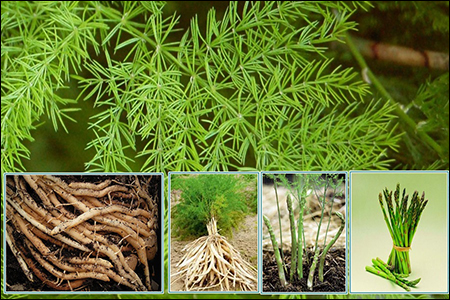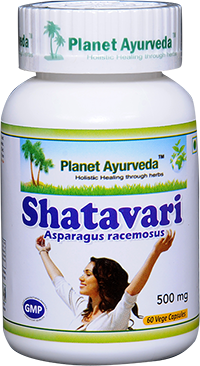Shatavari Usage, Health Benefits, Dosage & Products
ABSTRACT
Shatavari is the most popular medicinal plant these days. Scientifically it is known as Asparagus racemosus. It is a species of Asparagus plant. It belongs to the family of Liliaceae. In today’s life it is widely used to promote fertility and particularly for the female reproductive system. In the world of unhealthy and busy lifestyles, women’s health and mental status is of major concern, in which shatavari plays an important role. It is also known as a “female friendly herb”.Shatavri as the name suggests “who possesses a hundred husbands and is acceptable to many”. In ancient times its root was used for medicinal purposes. It is also known as” women’s ashwagandha”. Shatavri has a strong rejuvenating, nurturing and stabilizing effect. The present article includes a detailed description of shatavari and its use since ancient periods. Let’s discuss!

INTRODUCTION
The genus asparagus is found all over India and in the tropical areas of Asia and Africa. Its habitat is common in low altitudes. There are about a total 300 species all over the world and 22 species in India. Shatavari is widely used due to its multiple health benefits. According to classical text it is considered as ‘Rasayana’ which means plants promote general well-being by increasing cellular vitality and resistance. It acts as aphrodisiac, immunity booster, anti- dysenteric and antioxidant. It protects vital organs like the brain and heart. Mainly in Ayurveda used in dyspepsia (amlapitta) and increases milk secretion in lactating mothers. The dried roots are mostly used for drug purposes. Shatavari is mostly used as indigenous medicine. This amazing drug is also known as” the queen of herbs”. It is also used in diabetes, stress, liver cancers, chronic fever, etc.
MORPHOLOGY
The physical appearance of shatavari plant is as follows
- It is a tuberous / woody climber with hooked spines found all over India. It is 1-2m in height.
- Its roots are finger-like clusters, cylindrical and swollen in the middle. Roots are silvery white or ash colored, 5-15 cm in length and 2 cm in thickness. They are fleshy, spindle shaped tapering towards the base and swollen in the middle. On drying roots got longitudinal wrinkles and lacked well marked odor and morphology. They are mucilaginous and brittle.
- Its leaves are linear green colored and needle like pointed structure, small and uniform.
- Flowers are white in color, fragrant, minute and occur as solitary and fascicled. They are hermaphrodite, aromatic and polluted by bees.
- Branches are well modified into cladodes with long basal spines.
- There are two varieties of shatavari but having the same medicinal properties.
CHEMICAL COMPOSITION
Asparagus contains a wide range of phyto-chemical components, some of them are given below
- The active constituents present in shatavari are steroidal saponins and shatavarin (0.2%) present in roots and leaves.
- Shatavari is a phytoestrogen rich plant species.
- The plant also contains vitamins like A, B1, C, Mg, Ca, folic acid etc.
- Other constituents are essential oils, asparagine, arginine, flavonoids, resins and tannins.
- Its roots are rich in alkaloids which play an integral role in libido and immune system.
USES
Primarily used as female tonic and to correct infertility, there are many other uses of shatavari which are given below
- It acts as a female uterine tonic for gynecological problems.
- It maintains immunity against diseases.
- Its roots act as aphrodisiac, antispasmodic.
- Also used for nervousness, anorexia, insomnia.
- Act as brain tonic and nervine tonic.
- Can be used for abdominal disorders like gastritis, APD (Acid Peptic Diseases).
- It also has anti-aging properties.
- Anti-diarrheal and anti dyspepsia activity.
- Cardio protective activity.
- Act as anti hepatotoxic and anti-bacterial.
- Anti – inflammatory.
- It minimizes water weight from the body and removes toxins.
- Property of weight gain.
- It has a diuretic effect which detoxifies the body.
- Reduces anxiety (due to vata nashak property).
- Manages gastric ulcer as it increases gastric mucus secretion.
- Corrects respiratory system disorders like bronchitis.
SHATAVARI FOR WOMEN HEALTH
Shatavari plays a important role in female body, some are given below
- Shatavri roots are mainly used as galactogogue which stimulates breast milk secretion due to significant rise in prolactin level.
- In females it promotes a healthy reproductive system.
- It maintains hormonal imbalance disorders like PCOS (Polycystic Ovarian Syndrome).
- It relieves symptoms of PMS (Premenstrual syndrome) and menstrual cramps.
- It controls abnormal or prolonged bleeding.
- It corrects infertility, leucorrhoea.
- Can be taken during pregnancy if fatigue or folic acid deficiency.
- It regulates ovulation and corrects the menstrual cycle.
- It reduces menstrual cramps.
- Used for endometriosis treatment.
- It is widely used in threatened abortion and safe delivery because of its diView Poststinct uterine blocking activity.
HATAVARI IN CLASSICAL AYURVEDIC TEXTS
Shatavari is well defined by our ancient Acharya’s in classical textbooks. As shatavari balances pitta and vata dosha in our body but it can increase kapha dosha due to its heavy nature (guru guna). It is bitter and sweet in taste (rasa), and cold potency (sheet virya),. Its oily nature makes it easy for digestion and consumption.
-
- It acts as rasayan for the reproductive and digestive system.
- It has the property of tridosha Ghana (balances vata, pitta, and kapha).
- In Ayurveda it is widely used in threatened abortion and safe delivery because of its distinct uterine blocking activity.
- Its external use is mentioned in text as oil preparation in shiriroga (head disorders), charma roga (skin disorders) and vataj disorders.


Dosage
10-20 grams with milk
It is stanya janan (Inc. lactation), mutarjanan (diuretic), shukar janan (fertility), balya (Inc. strength), Agni vardhak (improves digestive fire), balya (weight gain).
Used to treat pandu (anemia) and kamala (jaundice).
FORMULATIONS
There are different formulations of Shatavari these days such as
- Shatavari powder (½ – 1 tablespoon twice daily after meals)
- Shatavari capsules ( 1-2 capsules twice daily, after meals)
- Shatavari ghrit ( 3-6 g with mishri or as directed by physician)
- Shatavari kalpa granule ( 1-2 tablespoon twice daily with milk or as directed by physician)
CONCLUSION
Shatavari is considered as a general health tonic, which increases vitality. It has been used for many centuries in the Indian Ayurveda system. It has been employed as galactogogue in Ayurveda and clinical investigation reveals its use in infertility. Overall it plays an important role in physical – mental debility and corrects tridosha in Ayurveda, mainly balances vata -pitta.




